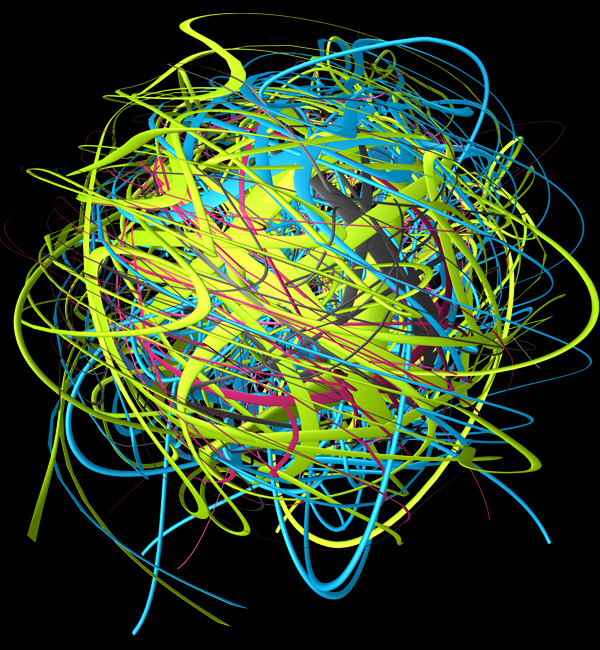Elections
So today we had elections, and by tonight you will have a lot of people doing a lot of electoral math.
I don’t like elections, because of an assumption problem. It isn’t linear. This is how we usually portray the choices in elections. You pick a candidate / party that fit where you are on this line.
In reality, this isn’t nearly as simple. Mostly because this one line assumes that there is a central idea that is important being anything else. But let us take a few examples:
- Tax policy
- Security policy
- Gay marriage
- Religion
- Social justice
- Climate change
Now, they don’t fit on a single line. Your position on gay marriage doesn’t impact what you want with regards to tax policy, for example. The real scenario is:

Now, usually there is some concentration of ideas, so it is typical that if you give me your idea about gay marriage, I can guess what your ideas about climate change are.
By the way, I am taking gay marriage and climate change as examples that are common in more than a single country.
But that is guessing. And in many cases, people are a lot more complex than that. We are limited to choosing a candidate, but what happens when we have someone who we support on issue X and oppose on issue Y? We have to make tradeoffs.
So you are limited to one vote, and have to choose something on this line. Yes, as a result of that you get commonalities, a lot of people that like position X also like position Y, but not always, and sometimes I find it abhorrent that someone with whom I share the position on X also have an opposed idea on Y.







Comments
Please, turn off comments for this post.
That's the inherent problem with parliamentary democracy... Only fix I see is become a dictator in your country :)
Why? His post does not discuss any political points. The whole post is discussing the complexity of finding agreement in such a 'mess' of different opinions / needs / requirements. Be it software-development or politics.
Actually, elections are pretty interesting from a mathematical point of view. For example, it's been proven that it's impossible to construct a voting system that always accurately reflects the majority view of the electorate.
http://en.wikipedia.org/wiki/Arrow%27s_impossibility_theorem
I have the same problem as Ayenda when talking about politics.
They allways seem to map a multi dimentional model onto a 1 dimentional line.
But there is no function which describes this pattern. It's allways up to the "Political Journalists" who pretend to be all knowing about this.
Graphically there is no way we can display anything more than 3 dimensions, so we either shouldn't or limit the discussions to 3 topics.
This is not even a continuum, but 1 discrete option out of several available. This should be enough to convince anyone that democratic election is a scam.
I get the various objections around politics, politicians, etc. I've always been frustrated with the narrow views you're forced into with left/right. I found this was a great tool for clarifying people's thinking around party affiliations: http://www.politicalcompass.org/
James, it's only systems that involve ranking that can't pick the most acceptable candidate. Systems that don't rank candidates (like http://en.wikipedia.org/wiki/Approval_voting) are able to pick the candidate that the largest number of people would approve of.
Range Voting! It's like Approval Voting on crack. Instead of checking a box, you give each candidate a score of 0-100 (or null). The candidate that is the least offensive to everyone wins. I dunno how this would work in a Parliamentary system though.
http://rangevoting.org/
This is why I believe that the system in Switzerland is awesome. Unlike in most other countries, they embrace direct democracy, effectively letting you vote on topics instead of politicians and parties. With the Internet at hand, we could easily make a poll for 2-3 topics every month leave that stupid left/right stuff aside.
Daniel, In such a system, you suffer from other problems. 1) Who can propose a topic? Who actually phrase the topic that will become law? 2) How do you ensure feedback during the vote process? 3) What about complex things? This sort of system is very vulnerable to the crowd effect. 4) What about emergency issues? How do you resolve them?
Nice post and very true. A solution might be somewhat harder to find, unfortunately.
The problem is countries tend to be run by some Sir Humprey, from a dark, smoky room.
The pirate party proposes a fluid democracy, which is like a direct democracy, but you may delegate your vote to anyone you wish, who may delegate onward and so forth. So you end up with a few people who can actually have some clout to negotiate with.
Comment preview